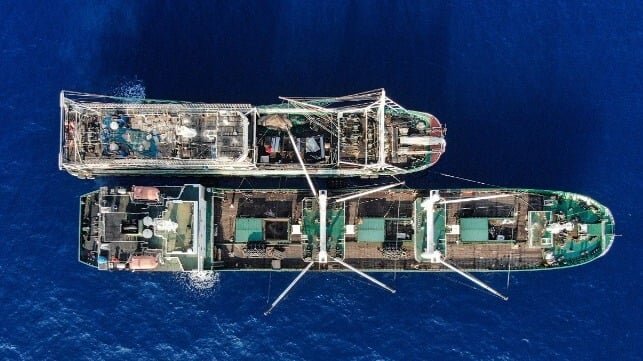The remaining three amendments relate to transhipment, or the transfer of fish from one vessel to another. Current regulations prohibit transhipment at sea, in order to prevent the laundering of IUU catch. The proposed amendments would allow it, with the condition that ships report to authorities before, during and after the process.
Thomson says the EJF welcomes the transparency of reporting, but is concerned about the lack of vessel monitoring systems on many Thai boats. “In 2018, we found that 80% of vessels did not have a satellite tracker,” he says. “So, even with reporting, it’s very difficult for authorities to know if the report is accurate.”
Viriyaroj says that transhipment is necessary for fishers to stay at sea for longer periods, and for boats to avoid going back to port before the end of the fishing season. Vessels that have to return to port to offload catch can lose valuable time, he adds.
But the IUU issue is a major concern. The EU lifted its “yellow card” warning in 2019 over IUU catch, but the proposed changes could jeopardize that progress. The EJF says that because Thailand is not party to the Port State Measures Agreement, which requires countries to prevent IUU catch from entering their ports, transhipment at sea could allow IUU fish to be laundered through Thailand.
Ronnarongpairee believes this would be a significant step backwards: “We are in a situation where we are in danger of being downgraded again. If the EU or US downgrades us again, it will be very difficult for us to come back. They will not believe in us anymore.”
Meerit is also concerned about the potential return of destructive practices with the proposed changes. “I am frightened by the past, and I am frightened for the future,” he says. “I do not want my children to follow in my footsteps, but I also do not want them to face the same problems that I have.”
The debate over the proposed changes to the Fisheries Act is ongoing, with the fate of Thailand’s fisheries hanging in the balance. For Meerit and others like him, the future of their livelihoods and the health of the oceans are at stake.
Thailand’s Fisheries Bill Sparks Controversy
A proposed fisheries bill in Thailand has sparked controversy and raised concerns among environmental activists and fishers. The bill, aimed at regulating the country’s fishing industry, is facing criticism for potentially rolling back progress made in combating illegal, unreported, and unregulated (IUU) fishing practices.
Remaining Problems
The Environmental Justice Foundation (EJF) claims that the remaining problems with the bill include issues related to labour rights, tariffs on low-value catch (commonly referred to as “trash fish”), and the practice of transferring catches between boats at sea, known as transhipment. Steve Thomson of the EJF highlights transhipment as a major concern, citing its potential to facilitate the mixing of legal and illegal catch without proper oversight.
Thomson warns that changes to the rules on transhipment could open the door for numerous fishing vessels to engage in this practice, leading to increased opacity and potential violations of fishing regulations.
International Standards vs. Concerns
While Thailand’s Department of Fisheries asserts that the country’s IUU measures meet international standards, concerns persist among activists and fishers. Viriyaroj, a representative of the department, defends the need for regulations on transhipment, arguing that it should be allowed with proper oversight rather than being outright banned.
However, critics remain skeptical, emphasizing the importance of stringent regulations to prevent abuses and ensure sustainable fishing practices.
Last Chance for Changes
Activists and fishers acknowledge the challenges of halting the bill entirely but stress the importance of advocating for changes to address the potential negative impacts on marine ecosystems and fishing communities. They fear that the proposed legislation could undo progress in combating IUU fishing and lead to overexploitation of marine resources.
Efforts to push for amendments and safeguards in the bill are seen as crucial to prevent a regression to past practices that harmed Thailand’s fisheries and reputation in the international community.
This article appears courtesy of Dialogue Earth and may be found in its original form here.

